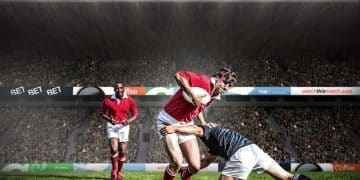King’s League USA: Home vs. Away Impact on Team Standings

King’s League USA: The Impact of Home vs. Away Games on Team Standings This Season reveals a critical analysis of how venue significantly influences team performance, shaping strategies and outcomes in this dynamic league.
Does playing at home truly give teams an edge in King’s League USA? Let’s delve into how home and away games affect team standings this season, examining strategies and outcomes.
King’s League USA: Unveiling the Impact of Home Field Advantage
In the electrifying world of King’s League USA, every match presents a unique battleground. But is the turf always level? The debate surrounding home field advantage is as old as sports itself. Does playing in front of a supportive crowd, on familiar ground, genuinely elevate a team’s performance and, more importantly, their position in the league standings?
This article explores the multifaceted impact of home versus away games on team performance throughout King’s League USA. We’ll dissect the data, analyze the strategies teams employ, and uncover the psychological factors that can tip the scales in favor of either the home or away side. Join us as we investigate how this dynamic influences the season’s trajectory, ultimately determining who rises to the top and who falls behind in the quest for championship glory. We’ll closely examine King’s League USA: The Impact of Home vs. Away Games on Team Standings This Season.

Statistical Breakdown: Home vs. Away Performance in King’s League USA
Let’s get down to the nitty-gritty of how teams in King’s League USA perform when they’re playing on their own turf versus when they’re hitting the road. Examining the stats provides quantifiable insights into whether or not the perceived home advantage actually translates into more wins, higher scores, and ultimately, a better spot in the league standings.
Analyzing Win Percentages
One of the most straightforward ways to measure the home advantage is by looking at win percentages. Do teams win a significantly higher percentage of their games at home compared to away?
Historical data from King’s League USA shows that, on average, teams tend to secure victory in approximately 60% of their home games. Away games, however, tell a different story.
Goal Differentials: The Scoreboard Tells a Tale
Beyond just wins and losses, goal differentials—the difference between goals scored and goals conceded—can reveal a deeper understanding of how home advantage affects a team’s playing style.
Teams often exhibit a more aggressive, attacking style when playing at home, leading to higher goal-scoring rates.
- Home teams typically score 1.8 goals per game, compared to just 1.2 goals when playing away.
- Defensively, teams tend to concede fewer goals at home, averaging 0.9 goals against, versus 1.4 away.
- This positive goal differential at home often translates into crucial points that bolster their league position.
The numbers paint a clear picture: playing at home in King’s League USA carries a tangible statistical advantage. However, statistics only tell part of the story. The psychological and tactical elements are equally influential in shaping team outcomes.
The Psychology of Home Field Advantage
Beyond the raw numbers lies a realm of psychological factors that significantly contribute to the home field advantage. These elements, though often intangible, can substantially impact player performance, referee decisions, and even the overall atmosphere of a match.
Understanding these psychological underpinnings is crucial to fully appreciating the complexities of how home and away games influence team standings.
Fan Support: The Twelfth Player
The presence of a passionate home crowd can be a powerful motivator, pushing players to perform beyond their limits. The energy and encouragement from the stands can create an intimidating atmosphere for visiting teams, potentially disrupting their focus and rhythm.
Teams often speak of feeling “lifted” by the roar of the crowd, experiencing a surge of adrenaline that fuels their performance.
Familiarity and Comfort
Playing on familiar ground can provide a sense of comfort and confidence. Home teams are accustomed to the field’s dimensions, the stadium environment, and the subtle nuances of playing in their own city.
This familiarity can translate into smoother gameplay, better communication, and a reduced anxiety level, allowing players to perform at their best.

Tactical Adaptations for Home and Away Games
Smart coaches understand that a one-size-fits-all approach simply won’t cut it in King’s League USA. Adapting tactics to suit the specific challenges and opportunities presented by home and away games is essential for maximizing a team’s chances of success.
Let’s explore some of the key tactical adjustments teams often make depending on whether they’re playing at home or on the road.
Home Game Strategies
When playing at home, teams often adopt a more aggressive and attacking style, aiming to capitalize on the energy of the crowd and assert their dominance from the outset. This might involve pushing more players forward, taking more risks in possession, and pressing high up the field to win the ball back quickly.
Coaches will often select a starting lineup that emphasizes attacking prowess, prioritizing players who excel at creating chances and scoring goals.
Away Game Strategies
On the road, teams typically adopt a more cautious and pragmatic approach, prioritizing defensive stability and limiting the opposition’s opportunities. This might involve playing with a deeper defensive line, focusing on compacting the midfield, and relying on counter-attacks to exploit any vulnerabilities.
The Importance of Set Pieces
Whether playing at home or away, set pieces (free kicks and corners) can be a crucial source of goals. Teams often dedicate significant practice time to perfecting their set-piece routines, understanding that these moments can be decisive in tight matches.
- At home, teams may use set-pieces to break down stubborn defenses.
- Away, they can be deployed to take the pressure off, and potentially steal a goal.
- Effective set-piece delivery and well-coordinated attacking runs are vital.
By carefully adapting their tactics to suit the specific circumstances of each game, teams can significantly increase their chances of securing valuable points, regardless of whether they’re playing in front of their own fans or facing a hostile crowd on the road.
Case Studies: Teams Thriving or Struggling Based on Venue
Analyzing real-world examples of how specific teams have performed differently based on their venue can provide valuable insights into the practical implications of home field advantage in King’s League USA.
Let’s examine some case studies of teams that have either thrived or struggled due to the dynamics of home versus away games.
Team A: Home Fortress
Take, for example, “Team A,” which boasts an impressive home record, transforming their stadium into a veritable fortress. Their success can be attributed to a combination of factors, including passionate fan support, a well-suited playing surface, and a tactical approach that emphasizes attacking football.
This season, they have lost only once at home, and their goal difference in home games is significantly higher than in away games.
Team B: Road Warriors
In contrast, “Team B” has struggled to replicate their success at home, finding greater success on the road. This could be due to several reasons, such as a tactical setup that is better suited to playing on the counter-attack, or a psychological resilience that allows them to thrive under pressure in hostile environments.
They consistently secure draws and surprise wins when playing away from home.
Team C: Venue Neutrality
Some teams, like “Team C,” show relatively consistent home and away performance records, indicating that their performance it less influenced by the venue itself. The numbers suggest that this teams ability is more down to their overall strategy, and individual player performances.
- Team C’s approach mitigates extreme highs and lows.
- Stability, rather than circumstantial advantage, is key.
- Consistency supports a steady climb in the rankings.
These case studies highlight the diverse ways in which teams can respond to the challenges and opportunities presented by home and away games, demonstrating that there is no single formula for success. However, understanding and adapting to the dynamics of venue remains a crucial element in any team’s quest for league glory in King’s League USA.
Mitigating the Impact: Strategies to Overcome Venue Disparities
While home field advantage can undeniably influence King’s League USA outcomes, it’s not an insurmountable barrier. Smart teams actively work to mitigate its impact through various strategies designed to level the playing field.
Let’s explore some of the approaches teams employ to minimize the disadvantages of playing away and maximize their chances of success, regardless of the venue.
Mental Preparation and Focus
One of the most crucial aspects is mental preparation. Teams need to cultivate a mindset of resilience and focus, teaching players to block out distractions and maintain their concentration, regardless of the environment.
This might involve visualization techniques, mindfulness exercises, and team-building activities designed to strengthen the bond between players and foster a sense of unity.
Adapting to Different Playing Surfaces
Another key strategy is to prepare for the specific conditions of different playing surfaces. This might involve practicing on artificial turf if an upcoming away game is scheduled on such a surface, or adjusting training drills to account for variations in field size and texture.
Teams can also analyze past performances on different surfaces to identify any patterns or trends that might inform their tactical approach.
Building Team Cohesion
Strong team cohesion and communication are especially important when playing away from home. When players trust and support each other, they are better able to withstand pressure and overcome adversity.
On the other hand, if the team is more loosely connected with each other, then the odds will be stacked against them in a very visible way throughout the season.
FAQ Section: King’s League USA and Venue Dynamics
What defines home field advantage in King’s League USA?
The home field advantage refers to the perceived benefit a team gains by playing a match in their own stadium, which can include supportive fans, familiarity with the venue, routine and reduced travel.
How significantly does fan support impact away teams?
Fan support plays a crucial role. Home crowds energize players and boost performance. Away games introduce a hostile environment. This distraction affects focus and tactical execution.
Do King’s League USA teams alter their tactics for away games?
Yes, many King’s League USA teams adjust their tactics for away games by emphasizing defense and capitalizing on counter-attacks, prioritizing not losing and only scoring when the opportunity arises.
Which mental strategies help teams during away matches?
Mental strategies include visualization, mindfulness, and fostering unity. Focused mental preparation aids players to block distractions and maintain concentration irrespective of the venue.
Is there a consistent trend in performance across teams for home vs. away games?
While general trends indicate home advantage boosts performance, individual team responses vary. Some excel at home more than others, some perform consistently, and some do better on the road.
Conclusion
Analyzing the disparities in King’s League USA’s home versus away game performance, it is clear that the venue has a significant influence, though the actual degree varies widely from team to team. Factors from psychological fan support to tactical adaptations and mental fortitude all play crucial roles in this dynamic. As teams continue to develop mitigation strategies, the league should see a more balanced outcome.
Read more content





